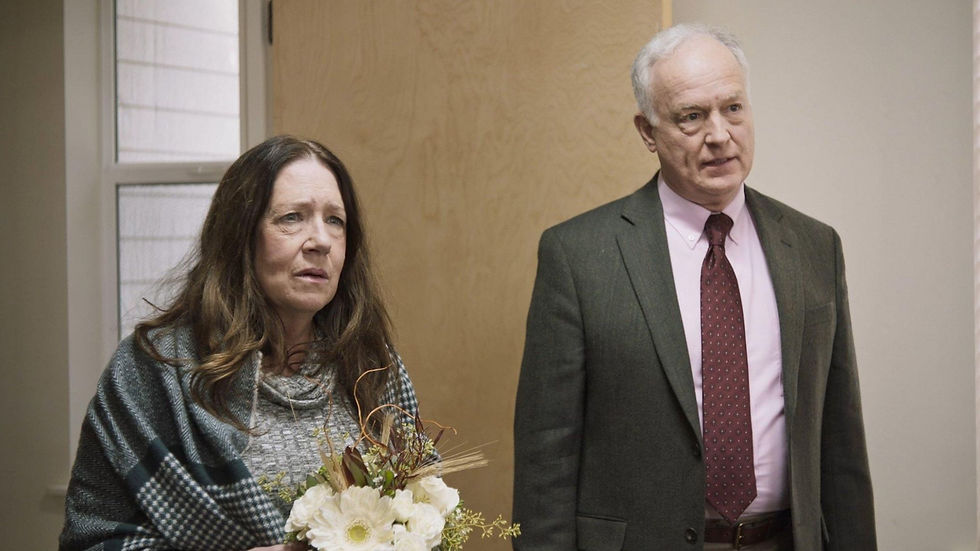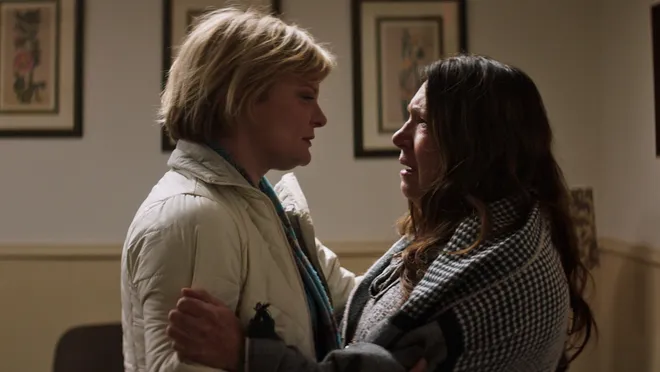Knowing When To Pull Back: Authenticity In Mass (2021)
- Fiona Craughwell
- May 22, 2022
- 4 min read
Mass was a highly anticipated 2021 film by filmmaker Fran Kranz. It touches on a genuine and raw topic that strikes deep into the heart of many Americans: school shooting. I believe everyone, including myself, was interested to see how such a dynamic theme would be handled. Sometimes filmmakers feel they need to exercise some restraint not to offend those affected by such issues, and some just go all out in the name of art and risk being cancelled.
Fran Kranz did neither, and the whole film was very bland. On a surface level, it said too much, while, on a much deeper, more symbolic level, it said nothing.
As humans, we have an obsession with violence and trauma. This probably explains why so many people are obsessed with true crime or why we all take a glance at the scene if we have come across a car accident. So, in a film about a mass shooting, we most likely want to know the ins and outs of it all. Also, on a more personal and selfish level, we want to reassure ourselves, like in old-school horror films, when it is revealed that the killer has some kind of metal illness, reassuring the viewer that no average person would be capable of doing such evil things. Mass gives into our morbid curiosity while at the same time reassuring us by providing the straightforward explanation of a loner overcome by his illness.

Holding up a mirror to society can be too close and too literal. It may cause your viewer to disengage or become overwhelmed by the topic as it is too close to what they see in the news or media. Countless documentaries cover such issues, and some do a fantastic job. Going into details and explanations and looking for answers rather than meaning makes a film factual, and we lose the human story we are trying to tell. While I was watching Mass, all I could think of was Bowling For Columbine, and I don’t think that that’s what I should have been thinking; I should have thought of it as something new. Film is the artistic expression of the real world and can show and mean so much more.
I previously praised a short animation, If Anything Happens I Love You, on this blog. That brief was totally and utterly about the humanity of seemingly inhumane crimes. Yes, it pauses to show us the harsh realities of a violent death (and does so in a far superior way to Mass), but its core story is about grieving parents trying to find a new life, if that is even possible without their child.
Filmmakers like Michael Haneke frequently use near-inhuman violence and plots in order to try and say something about society as a whole, but they always remains a step or two removed, like holding a somewhat foggy mirror up to society to cause it to look at itself. Haneke does so even though his storylines are fictitious enough not to resemble the real world, so we can engage rather than turn our heads in shame and disappointment. We are more receptive to criticism if it is slightly indirect.

It isn’t just this plot and execution of the plot that’s lacking; the execution of the film as a whole is jarring. Something is off. I love the idea of the film being shot mostly on location with minimal actors and storylines. This idea creates a still environment conducive to focus, yet the camera shakes so often in the film, and I can understand why it is totally distracting and ultimately robs us of the moment. I mentioned earlier how If Anything Happens I Love You wasn’t afraid to go into the dark corners of its story, but did so in a compellingly manner Here, the metaphor used was extremely heavy-handed and didn’t really carry much meaning. A red ribbon caught on barbed wire fights against the wind. It is bashed over and over to give up and stay there motionless ultimately. If you are going to take on the topic of mass shootings, you have to do something with it; you have to go all in. Much like when 9/11 happened, studios were not sure how to handle it; to make a film or give it time. Sure enough, the first post-9/11 film made about the incident was not received well, not because people weren’t ready, but because the film did not do enough.
What hurts the film more than anything else is its ending. A young man has died at the hands of his classmate. Both sets of parents are grieving. There is no resolution to this. They talk and go back and forth with each other, but what is there to be said at the end of the day? There will be no final resolution, so why even try to find or establish one? This final moment between parents feels forced, phoney and unrealistic. It is a very glossy Hollywood ending for a film that seems intent on promoting realism. So much of it feels like a documentary.
Roman Polanski’s Carnage is another film that comes to mind when watching Mass. Both films have similar story lines; two sets of parents meet to discusses their children’s issues with each other. Carnage is a much more lighthearted tale filled with humour, but there are similarities. We want to know the background and what the boys disagreed about in Carnage. We want our thirst for knowledge to be quenched, and, to a certain extent, we are given the answer. Although, we are given information, we still do not really know what the hell is going on, and that makes the film. We get no closer to an answer, at least from the parents’ side.
Most people don’t get the answers they are looking for. Most people aren’t lucky enough to get closer. Mass sets us up to want to find answers to extremely difficult questions, but it goes a step too far and unrealistically solves an impossible problem.






Comments